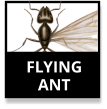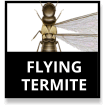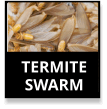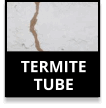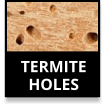Hundreds of termite species exist globally, but the Eastern Subterranean termite is most common in Langhorne. Subterranean termites are highly destructive to man-made structures.
These termites have large underground colonies and powerful jaws. They continuously eat wood, 24/7. They are the most common termite in the U.S., found in 49 states (excluding Alaska). They live underground but consume wooden structures like garages, sheds, barns, homes, and office buildings.
A common sign of infestation is mud tunnels on the building's exterior or in the soil. These protect termites from sun and predators. Untreated infestations can completely destroy a building.
Termites often cause the most damage in less-frequented areas like basements and crawl spaces. Infestations can be well-established before discovery.
Preventative measures and regular inspections by licensed technicians are crucial for early detection and minimizing damage.
Termites are social insects living in large colonies with several castes: workers, soldiers, and reproductives.
Workers are creamy white and rarely seen unless infested wood or mud tunnels are disturbed. They have large heads, translucent bodies, and dark jaws, and are about one-eighth of an inch long.
Soldiers are slightly larger, with even bigger heads. They are yellowish or dark brown and have powerful pincers for colony defense.
Reproductives (swarmers) are often the first sign of infestation. They have wings and fly out of the nest in spring to mate. They are typically dark brown or black, with two pairs of equal-length wings. They can be mistaken for carpenter ants, but ants have unequal wing pairs and a slimmer waist.
Subterranean termites build nests near food sources, specifically wood in contact with or near soil. They consume wooden posts, window frames, sills, joists, subflooring, and staircases. They do not eat human or pet food.
Termites in Langhorne thrive near man-made structures or food sources. They build mud tubes to travel between the nest and food. Nests are typically located in moist soil, 4 to 18 inches below the surface, and contain interconnected galleries and tunnels.
Visible signs of termite damage include buckling wood, swollen ceilings or floors (sometimes mistaken for water damage), and maze-like patterns on walls or furniture.
Most damage occurs out of sight. Colonies can contain up to one million members, with workers consuming up to 15 pounds of wood weekly. Termites can destroy foundations, support beams, plastic pipes, insulation, and other wood or paper-containing structures.
Subterranean termites have aggressive appetites for wood but are not aggressive towards people. Workers and soldiers can bite if disturbed, but this is rare.
Some termites can carry diseases like polio, dysentery, gastroenteritis, and typhus. However, transmission is rare due to limited human-termite contact. Termite feces can contaminate indoor air, potentially causing asthma and respiratory issues.
Signs of termite infestation include:
Preventative measures include:
Newtown Termite & Pest Control is a certified Termidor® exterminator. We use Termidor®, a leading termiticide, applied to the structure's exterior. Termidor® is undetectable to termites and kills by contact and ingestion.
USDA testing showed no termite damage in concrete slab structures treated with Termidor® 80 WG for over 15 years.
Our experienced technicians apply Termidor® along the foundation or exterior of the home or business.
The termiticide binds to the soil and is transferred to termites upon contact. It also spreads within the colony as infected termites interact with others. Termidor® kills by both ingestion and contact.
Our termite control service eliminates existing infestations and protects against future occurrences.
Newtown Termite & Pest Control has served area homes and businesses since 1993. We are a family-owned and managed pest control provider with an A+ Better Business Bureau rating. Our certified technicians have over 50 years of combined field experience.
We offer a renewable, transferable, triple guarantee:
Industry experts recommend a full termite inspection every two to three years.
Termites, known as "silent destroyers," can go unnoticed until significant damage occurs.
Professional inspections by certified technicians are the best way to detect termites early and prevent extensive damage.
Schedule a FREE inspection today.
Courtesy: Newtown Termite & Pest Control, Inc.
Courtesy: Newtown Termite & Pest Control, Inc.
